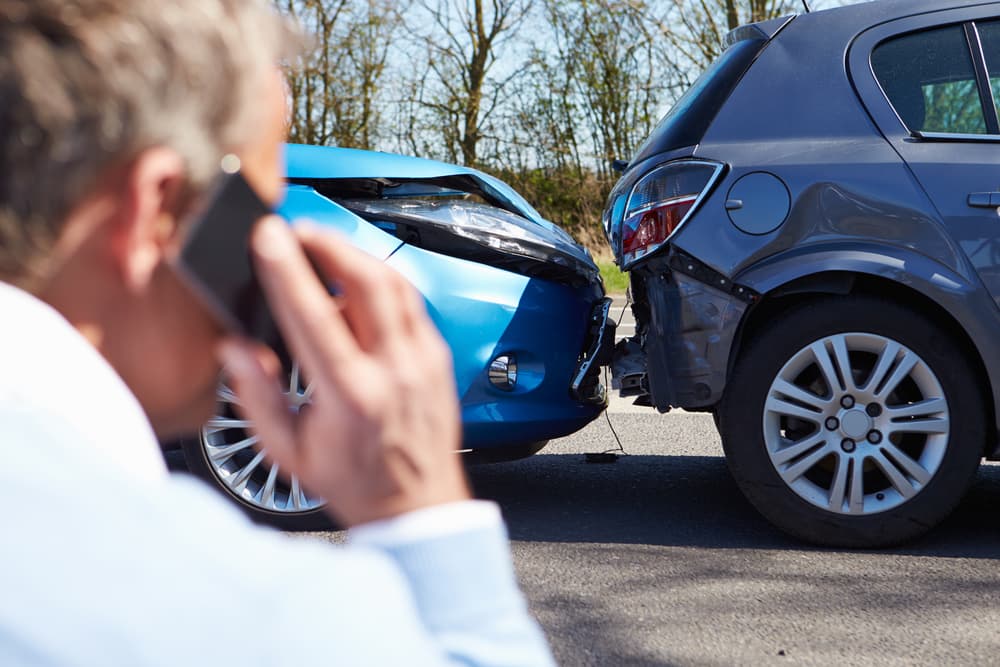Do I Call my Insurance Company if it’s not my Fault?

In addition to seeking prompt medical treatment after a motor vehicle accident, you should take several important steps to safeguard your legal rights and interests. One of those steps is to notify your insurance company about the accident. Remember that you need to take this step regardless of how your accident occurred or who was at fault. Notifying your insurance company about the accident fulfills your contractual obligations under your insurance contract. Additionally, suppose the at-fault driver lacks insurance coverage or sufficient insurance coverage. In that case, your insurance company can provide the monetary compensation you need through an uninsured or underinsured motorist claim.
You need to involve an experienced personal injury lawyer in your case as soon as possible after your car accident. Your attorney can review the terms of your insurance policy with you, contact your insurance company about the accident, and handle the claims-filing and settlement negotiation processes for you. In addition to fielding settlement offers on your behalf, your attorney can guide you in deciding whether to accept a pending settlement offer or litigate your case to a resolution in the state court system.
Types of Driver Negligence in Motor Vehicle Accidents
 Driver negligence can manifest in various forms, contributing to car, truck, motorcycle, and bicycle accidents. In the context of car accidents, distracted driving stands out as a prevalent form of negligence. This includes texting, talking on the phone, or other distractions diverting a driver’s attention away from the road. Inattentiveness increases the risk of collisions with other vehicles or pedestrians, often resulting in severe consequences.
Driver negligence can manifest in various forms, contributing to car, truck, motorcycle, and bicycle accidents. In the context of car accidents, distracted driving stands out as a prevalent form of negligence. This includes texting, talking on the phone, or other distractions diverting a driver’s attention away from the road. Inattentiveness increases the risk of collisions with other vehicles or pedestrians, often resulting in severe consequences.
Speeding is another common form of negligence leading to accidents across different vehicle types. Exceeding the posted speed limits or driving too fast for road conditions reduces a driver’s ability to react promptly to unexpected situations. Speed-related accidents can result in more severe injuries and damage due to the increased force of a collision.
Truck accidents often involve negligence related to driver fatigue. Truck drivers, especially those on long-haul routes, may push the limits of their driving hours, leading to exhaustion. Fatigued driving compromises a driver’s alertness and reaction times, making them more prone to causing accidents. Additionally, issues like inadequate training, poor vehicle maintenance, FMCSA violations, or improper cargo securement may contribute to negligence in truck accidents.
Motorcycle accidents frequently involve negligence related to visibility. Other drivers failing to see or properly gauge the speed of motorcycles on the road can result in collisions. Intersection-related negligence, when drivers fail to give the right-of-way to motorcyclists or run red lights, is also a significant contributor to motorcycle accidents.
In bicycle accidents, drivers may be negligent in providing sufficient clearance. Failing to maintain a safe distance when passing cyclists or disregarding designated bike lanes can lead to accidents. Similarly, failing to yield to cyclists at intersections or during turns contributes to a substantial portion of bicycle accidents.
Common across all vehicle types is negligence related to driving under the influence (DUI). Impaired driving, whether due to alcohol or drugs, significantly increases the likelihood of accidents. Impaired drivers exhibit compromised judgment, coordination, and reaction times, posing a severe risk to themselves and others on the road.
Understanding and addressing these various forms of negligence are essential for promoting road safety. Efforts to mitigate these behaviors through safe driving, law enforcement, and improved infrastructure can reduce accidents and enhance overall safety on local roads.
Common Injuries in a Motor Vehicle Collision
Motor vehicle accidents that involve negligent drivers can result in debilitating injuries that leave accident victims incapacitated and constantly in need of additional medical treatment. The specific injuries that an accident victim suffers may depend upon the speeds of the involved vehicles, the type of accident that occurs, the number of collisions, and the amount of force associated with those collisions. Some of the most common injuries that motor vehicle accident victims may suffer due to someone else’s negligence include:
- Internal bleeding and organ damage
- Soft tissue neck and back injuries
- Facial contusions
- Spinal cord injuries
- Complete and incomplete paralysis injuries
- Traumatic head and brain injuries
- Bone fractures
- Rib fractures
- Mouth and teeth injuries
Your lawyer can assemble the documents necessary for your personal injury claim upon suffering any of these injuries in a motor vehicle accident. At the same time, you focus on attending medical visits and getting the treatment you need to recover fully.
Why You Should Still Call Your Insurance Company if Someone Else Caused Your Motor Vehicle Accident
Contacting your insurance company after a motor vehicle accident, even if someone else is at fault, is a prudent and essential step in the aftermath of such incidents. While the other driver may be responsible for the accident, your insurance company is crucial in facilitating the claims process and protecting your interests.
First, reporting the accident to your insurance company is often a contractual obligation outlined in your insurance policy. Notifying them promptly may result in complications or delays in processing your claim. Timely communication helps establish a transparent and cooperative relationship, ensuring the smooth progression of the claims procedure.
Moreover, involving your insurance company early allows them to initiate their investigation into the accident. They can gather relevant information, assess damages, and determine the extent of liability. This proactive approach is essential in building a strong case to pursue compensation for your injuries, vehicle damage, and other losses.
Your insurance company also acts as a mediator between you and the at-fault driver’s insurance provider. Navigating the complexities of negotiations and settlements can be challenging, but having your own insurer involved helps streamline the process.
Furthermore, even if we consider the other driver at fault, there may be circumstances where their insurance coverage is insufficient or nonexistent. In such cases, your own insurance policy, particularly if it includes underinsured or uninsured motorist coverage, can step in to provide additional financial support. This coverage helps bridge the gap between the at-fault driver’s insurance limits and the actual costs associated with the accident.
In essence, involving your insurance company is a proactive measure to safeguard your interests and streamline the claims-filing and settlement negotiation processes. By promptly reporting the accident to your insurer, you maximize your likelihood of receiving favorable monetary compensation for your accident-related losses.
Third-party, Uninsured, and Underinsured Motorist Claims After a Car Accident
 After a car accident, individuals may pursue different types of insurance claims depending upon their circumstances. Two common categories are third-party claims and uninsured or underinsured motorist (UM/UIM) claims, each with distinct characteristics.
After a car accident, individuals may pursue different types of insurance claims depending upon their circumstances. Two common categories are third-party claims and uninsured or underinsured motorist (UM/UIM) claims, each with distinct characteristics.
A third-party claim arises when you file a claim against the at-fault driver’s insurance company. In this scenario, the other driver is considered the first party, their insurance provider is the second party, and you, as the injured party, are the third party. Pursuing a third-party claim implies that you seek compensation from the responsible party’s insurance to cover your medical expenses, property damage, and other losses. This process involves negotiating with the at-fault driver’s insurance company to reach a settlement that adequately addresses your needs.
Conversely, an uninsured or underinsured motorist claim involves seeking monetary compensation from your own insurance company when the at-fault driver either doesn’t have insurance (uninsured) or has insufficient coverage (underinsured). In these cases, your insurance policy should include UM/UIM coverage, which acts as a safeguard against scenarios where the responsible party’s insurance falls short. Claiming your policy ensures that you have a source of compensation even when the at-fault driver lacks adequate coverage.
One notable difference between these types of claims lies in the responsible party. You deal directly with the at-fault driver’s insurance company in a third-party claim. The negotiation involves demonstrating the other driver’s liability and securing compensation from their policy. On the other hand, in a UM/UIM claim, you are working with your insurance provider. Thus, the focus shifts to your coverage and how much it can bridge the gap left by the at-fault driver’s insufficient or nonexistent insurance.
The claim process for both types also differs in terms of negotiation dynamics. In a third-party claim, you and the at-fault driver’s insurance company negotiate the settlement directly. Conversely, in a UM/UIM claim, your insurance company steps into the shoes of the responsible party, essentially representing the at-fault driver.
Understanding these distinctions is crucial for individuals navigating the aftermath of a car accident and determining the most appropriate course of action based on the specific circumstances of their case. An experienced personal injury attorney can handle all written and spoken communications with insurance company representatives in your case and pursue fair monetary compensation for your injuries and damages.
Recovering Financial Compensation for Your Accident-related Losses
Victims of car, truck, motorcycle, or bicycle accidents resulting from someone else’s negligence may be entitled to various financial compensation to address their injuries and losses. These compensations encompass economic and non-economic damages and aim to provide a comprehensive remedy for the overall effects of the accident.
Economic damages, which are tangible and quantifiable losses, play a significant role in compensating victims for the financial toll of their accident. Medical expenses constitute a substantial portion of economic damages, covering the costs of immediate and ongoing healthcare needs. This encompasses hospital bills, surgeries, medications, rehabilitation, and any other necessary medical treatments.
Loss of earnings is another form of economic compensation that addresses the financial effect on victims who cannot work due to injuries sustained in the accident. This includes compensation for missed income during the recovery period, as well as potential future earning capacity if the injuries result in a longstanding or permanent disability, such as paralysis.
Property damage compensation is relevant for victims whose vehicles, whether cars, trucks, motorcycles, or bicycles, suffer damage in the accident. This includes the cost of repairing or replacing the damaged vehicle and any personal belongings within the vehicle at the time of the incident.
Nonetheless, non-economic damages acknowledge the intangible and subjective losses the accident victim experiences. Pain and suffering compensation aims to address the physical discomfort, emotional distress, and overall toll on the victim’s well-being resulting from the accident. This category recognizes that the effect of an accident extends well beyond the victim’s measurable financial losses.
Loss of consortium is another non-economic damage that pertains to the effects on an accident victim’s relationships. Spouses or family members may be entitled to compensation for the loss of support, companionship, and the overall disruption to their personal lives due to the injuries the accident victim sustained.
Overall, the available types of financial compensation aim to address the multifaceted consequences of accidents resulting from negligence. By recognizing both the tangible and intangible losses that accident victims may incur, the legal system endeavors to provide a thorough and equitable remedy for those adversely affected by such incidents.
Contact an Experienced Motor Vehicle Accident Lawyer Near You Today

Ted R. Lorenz, Personal Injury Lawyer
Even if you were not the one who caused your motor vehicle accident, always notify your insurance company about the occurrence. Failing to take this action may have severe consequences, especially if the at-fault driver is uninsured or underinsured. Additionally, prompt communication with your insurance company allows them to gather crucial information early on, facilitating a smoother claims process and ensuring your rights and entitlements are fully protected.
A knowledgeable car accident lawyer can handle all communications with insurance company representatives for you so that you can focus your attention on obtaining the comprehensive medical care you need. Additionally, your lawyer can file a claim or lawsuit with the appropriate insurance company on your behalf, negotiate for fair settlement compensation, or litigate your case through the court system to a resolution if that step becomes necessary.
Throughout the entirety of the legal proceedings, your attorney will stand as your unwavering advocate, diligently and tirelessly striving to secure not only just and equitable monetary compensation but also to provide the essential support needed to cover the myriad losses incurred due to the accident. With a steadfast commitment to your case, your attorney will navigate the complexities of the legal process to ensure you receive the rightful restitution you deserve.
